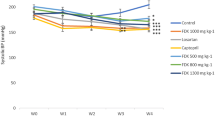We analyzed changes in angiotensin-converting enzyme activity in the aorta of hypertensive SHR rats against the background of age-related BP increase (from week 7 to 14) and the effect of dihydroquercetin on BP rise and angiotensin-converting enzyme activity. Normotensive WKY rats of the same age were used as the control. BP and activity of angiotensin-converting enzyme in the aorta of SHR rats increased with age. Dihydroquercetin in doses of 100 and 300 μg/kg per day had no effect on the increase of these parameters; dihydroquercetin administered to 14-week-old WKY rats in a dose of 300 μg/kg reduced activity of the angiotensin-converting enzyme. Thus, the early (7-14 weeks) increase in BP and angiotensin-converting enzyme activity in the aorta of SHR rats was not modified by flavonoids (dihydroquercetin) in contrast to other rat strains and humans, which is indicative of specificity of hypertension mechanism in SHR rats.
Similar content being viewed by others
References
Ackermann A, Fernández-Alfonso MS, Sánchez de Rojas R, Ortega T, Paul M, González C. Modulation of angiotensin-converting enzyme by nitric oxide. Br. J. Pharmacol. 1998;124(2):291-298.
Arutyunyan TV, Korystova AF, Kublik LN, Levitman MKh, Shaposhnikova VV, Korystov YN. Effects of taxifolin on the activity of angiotensin-converting enzyme and reactive oxygen and nitrogen species in the aorta of aging rats and rats treated with the nitric oxide synthase inhibitor and dexamethasone. Age (Dordr). 2013;35(6):2089-2097.
Boluyt MO, Bing OH. Matrix gene expression and decompensated heart failure: the aged SHR model. Cardiovasc. Res. 2000;46(2):239-249.
Carlstrom J, Symons JD, Wu TC, Bruno RS, Litwin SE, Jalili T. A quercetin supplemented diet does not prevent cardiovascular complications in spontaneously hypertensive rats. J. Nutr. 2007;137(3):628-633.
de Gasparo M, Catt KJ, Inagami T, Wright JW, Unger T. International union of pharmacology. XXIII. The angiotensin II receptors. Pharmacol. Rev. 2000;52(3):415-472.
Duarte J, Pérez-Palencia R, Vargas F, Ocete MA, Pérez-Vizcaino F, Zarzuelo A, Tamargo J. Antihypertensive effects of the flavonoid quercetin in spontaneously hypertensive rats. Br. J. Pharmacol. 2001;133(1):117-124.
Emel’yanov MO, Korystova AF, Kublik LN, Levitman MKh, Shaposhnikova VV, Korystov YN. Low doses of ethanol decrease the activity of the angiotensin-converting enzyme in the aorta of aging rats and rats treated with a nitric oxide synthase inhibitor and dexamethasone. Clin. Sci. (Lond). 2012;122(2):75-81.
Grassi D, Desideri G, Ferri C. Flavonoids: antioxidants against atherosclerosis. Nutrients 2010;2(8):889-902.
Landgraf SS, Wengert M, Silva JS, Zapata-Sudo G, Sudo RT, Takiya CM, Pinheiro AA, Caruso-Neves C. Changes in angiotensin receptors expression play a pivotal role in the renal damage observed in spontaneously hypertensive rats. Am. J. Physiol. Renal. Physiol. 2011;300(2):F499-F510.
Maron D.J. Flavonoids for reduction of atherosclerotic risk. Curr. Atheroscler. Rep. 2000;6(1):73-78.
Nandave M, Ojha S.K, Arya D.S. Protective role of flavonoids in cardiovascular diseases. NPR. 2005;4(3):166-176. [http://nopr.niscair.res.in/handle/123456789/8044].
Reed J. Cranberry flavonoids, atherosclerosis and cardiovascular health. Crit. Rev. Food Sci. Nutr. 2002;42(3, Suppl):301-316.
Author information
Authors and Affiliations
Corresponding author
Additional information
Translated from Byulleten’ Eksperimental’noi Biologii i Meditsiny, Vol. 161, No. 5, pp. 610-614, May, 2016
Rights and permissions
About this article
Cite this article
Slashcheva, G.A., Rykov, V.A., Lobanov, A.V. et al. Dihydroquercetin Does Not Affect Age-Dependent Increase in Blood Pressure and Angiotensin-Converting Enzyme Activity in the Aorta of Hypertensive Rats. Bull Exp Biol Med 161, 670–673 (2016). https://doi.org/10.1007/s10517-016-3482-3
Received:
Published:
Issue Date:
DOI: https://doi.org/10.1007/s10517-016-3482-3



